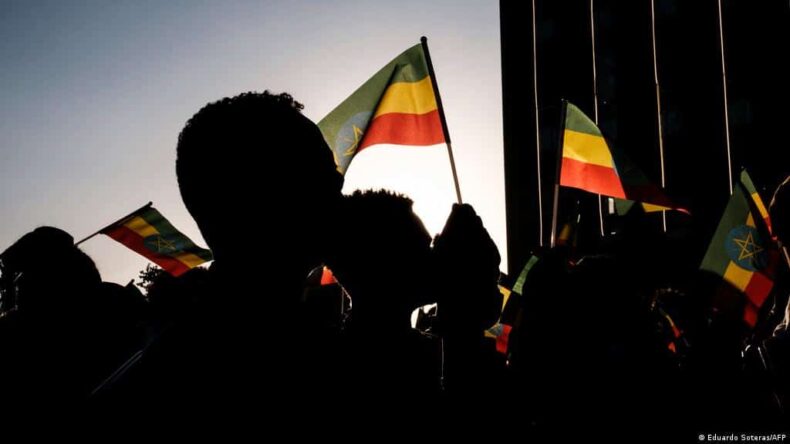A peace talks strategy is the set of sociopolitical negotiations, commitments, and litigations that conduct to understand a particular armed conflict

If Debretsion Gebremichael observes the proposed talks between the Tigray and Ethiopian aspects, it will be the highest-level action also to end the two-year war that has destroyed thousands of people from conflict and starvation.
The governor of Ethiopia’s embattled Tigray nation has been asked to peace talks in South Africa this weekend as a proportion of a pan-African accomplishment to end one of the world’s supreme-dominated wars, according to a letter recognized by The Associated Press.
A politician In Addis Ababa said the AU was still waiting for an acknowledgment from the Tigray side. The diplomat spoke under the circumstance of anonymity because they were not approved to speak publicly.
The letter from the chair of the African Union Commission asserts the AU-convened talks would be “aimed at establishing the foundation for a structured and strengthened mediation” between the two aspects toward a “durable perseverance of the conflict.”
The spokesman for the Tigray forces, Getachew Reda, could not instantly be attained on Wednesday.
Ethiopia’s administration in a declaration verified the petition for the talks and said it is “consistent with the Ethiopian government’s preliminary positions” that talks be moderated by the AU and be clasped without preconditions. The announcement, regardless, does not bestow components about who might accompany.
The AU letter declares the talks would be encouraged by AU extraordinary diplomat and former Nigerian President Olesegun Obasanjo with the consent of former Kenyan President Uhuru Kenyatta and former South African Deputy President Phumzile Mlambo-Ngcuka.

The talks appear more than a month after battling in Tigray renewed subsequent months of comparative peace. Forces from neighboring Eritrea, allied with Ethiopia’s government, are again joining the fighting in what Tigray forces have depicted as a large-scale offensive.
The Tigray country has been primarily cut off from the world since the war commenced in November 2020, with more than 5 million nations without essential services encompassing electricity, phone, internet, and banking. Medicines have run desperately inadequate. On Thursday, the U.N. said trapped staffers were eventually prepared to tighten out of the region for the first time since the fighting revived.
The conflict also has overflowed into Ethiopia’s adjacent provinces of Amara and Afar as Tigray forces have tried to pressure the government, settling hundreds of thousands of other civilians in trouble.
United Nations-based investigators have said all aspects have dedicated misuses.
Prefer peace talks over fighting
Peace talks arouse a tremendous contract of public awareness, which is normal assessing the human need to procure an end to disputes.
Confabs where gatherings are required to sit down and reconcile their way out of conflict tend to produce a great deal of media attention. What is frequently missed is that extremely rare of these sit-downs are significant accomplishments to end fighting.
Several – if not extensively – of these conferences take place because the supporters of the belligerents or the moderators desire to indicate their respective audiences that they are helping toward peace even though they understand that the war at hand will be waged for a long time.

Since an armed conflict happening, peace processes can contain deterrence of an intra-state or inter-state conflict from escalating into a military confrontation. The United Nations Department of Peace Operations (UNDPO) phrases the prevention of disputes from escalating into armed disputes as war prevention.
In 2007, the United Nations Secretary-General’s Policy Committee categorized both preliminary prevention of an armed conflict and prevention of the repetition of a solved conflict as peacebuilding.
Ethiopian military ceremony with national flags connected to their rifles at a conference governed by local councils to demonstrate assistance for the Ethiopian National Defense Force (ENDF), at Meskel Square in downtown Addis Ababa, Ethiopia
The Tigray forces disputing Ethiopian troops said, they were inclined to accept by sudden extinction of oppositions and participate in a peace procedure led by the African Union, a significant shift that came after new pressure by the United States and others obeying the rejuvenation of fighting last month that devastated months of comparative peace.
The administrator of Ethiopia’s embattled Tigray nation and the federal government have been Persuaded to peace talks in South Africa this weekend as part of a pan-African effort to end one of the world’s extensively neglected wars.
“The government of Tigray is equipped to contribute to a vigorous peace process under the auspices of the African Union,” asserted a declaration by the authorities in the northernmost nation of Tigray.
May the conferences in the conflict have the power to choose talks over fighting and declared an African Union-led process that produces an enduring peace.














